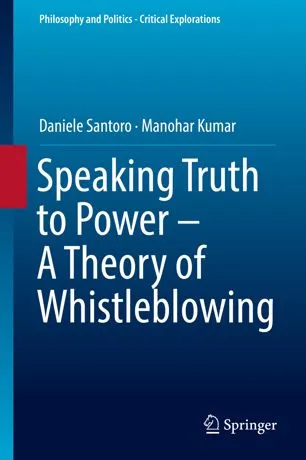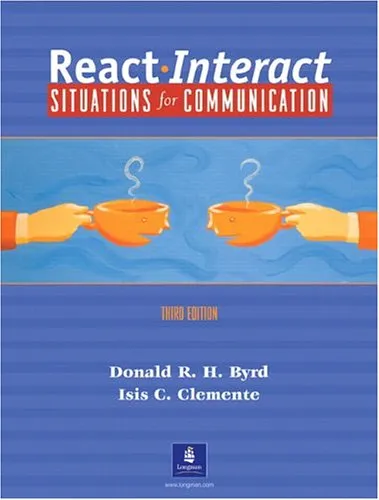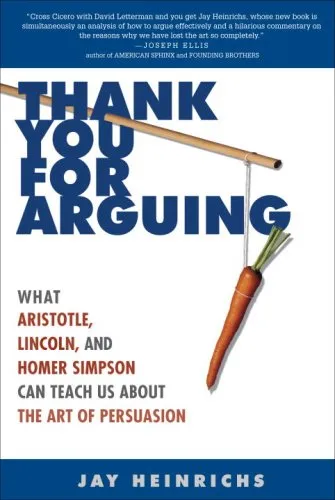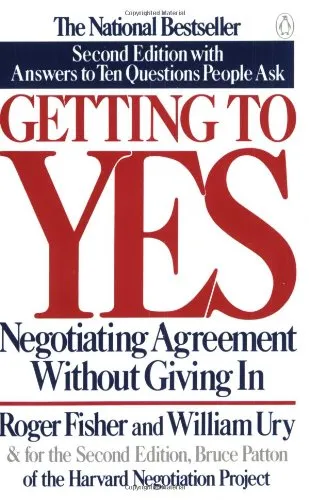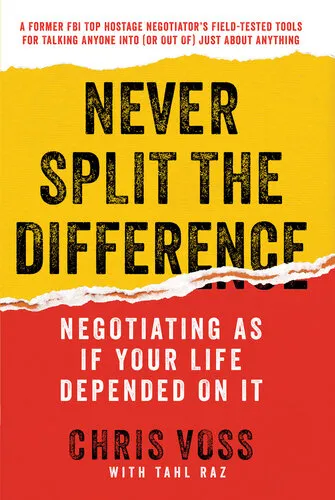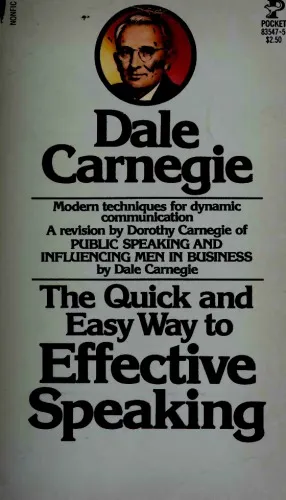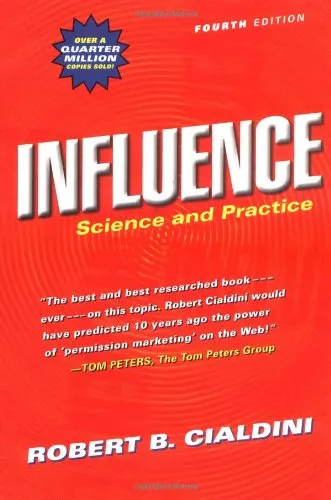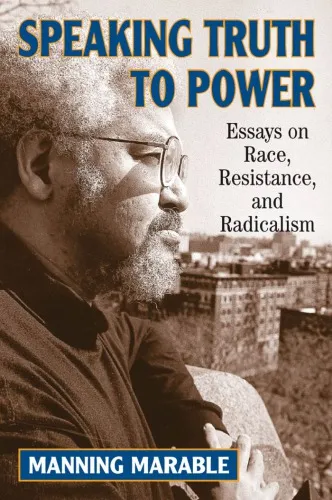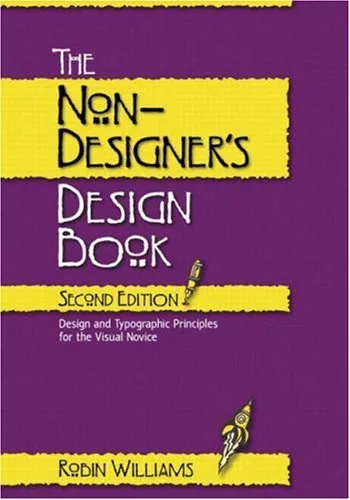Speaking Truth to Power - A Theory of Whistleblowing
4.5
بر اساس نظر کاربران

شما میتونید سوالاتتون در باره کتاب رو از هوش مصنوعیش بعد از ورود بپرسید
هر دانلود یا پرسش از هوش مصنوعی 2 امتیاز لازم دارد، برای بدست آوردن امتیاز رایگان، به صفحه ی راهنمای امتیازات سر بزنید و یک سری کار ارزشمند انجام بدینکتاب های مرتبط:
مقدمهای بر کتاب "Speaking Truth to Power: A Theory of Whistleblowing"
کتاب Speaking Truth to Power: A Theory of Whistleblowing نوشته دانیله سانتورو و مانهار کومار، یکی از جامعترین پژوهشهای نظری در حوزه Whistleblowing (افشاگری) است. این کتاب تلاش دارد تا به بررسی مسائل اخلاقی، سیاسی و اجتماعی مرتبط با افشاگری پرداخته و نقش آن در دموکراسی و حفظ حقوق انسانی را آشکار کند. نویسندگان از منظر فلسفه سیاسی و اخلاقی به این موضوع نگریسته و دیدگاههایی نوآورانه و عمیق ارائه دادهاند.
خلاصهای دقیق از کتاب
این کتاب به چهار بخش کلیدی تقسیم شده است: تعریف دقیق از Whistleblowing، تحلیل اخلاقی آن، پیامدهای سیاسی و اجتماعی آن، و در نهایت پیشنهاداتی برای قانونگذاری و مدیریت اخلاقی این پدیده. نویسندگان بر این باورند که افشاگری عملی است که در فضای تعارض بین وفاداری به سازمان و تعهد به حقیقت و اخلاق قرار میگیرد.
در بخش اول کتاب، مفهوم Whistleblowing به طور مشروح تعریف میشود و معیارهایی که یک عمل افشاگری را مشروع و اخلاقی میسازد، تحلیل میگردد. بخش دوم، بر چالشهای اخلاقی افشاگری متمرکز است. نویسندگان به این میپردازند که چگونه اخلاق فردی و جمعی میتواند در شرایط افشاگری تغییر کند. بخش سوم به تاثیرات سیاسی و اجتماعی افشاگری اختصاص دارد و نقش افشاگران در بالا بردن شفافیت، پاسخگویی و عدالت بررسی میشود. در نهایت، بخش چهارم سیاستهای عمومی و قوانینی را پیشنهاد میکند که هم از افشاگران محافظت کرده و هم تضمینی برای حفظ منافع عمومی باشد.
نکات کلیدی
- افشاگری به عنوان عملی اخلاقی و گاه قهرمانانه تعریف میشود که میتواند به تغییرات اجتماعی و سیاسی منجر شود.
- نویسندگان به پیچیدگیهای مرتبط با وفاداری سازمانی و تعهد به حقیقت پرداختهاند.
- کتاب نشان میدهد که افشاگران معمولاً با ریسکهای جدی، از جمله امنیت شخصی و حرفهای، مواجه هستند.
- اهمیت ایجاد چارچوبهای قانونی برای حمایت از افشاگران و در عین حال جلوگیری از سوءاستفاده از Whistleblowing.
جملات معروف از کتاب
"افشاگران حقیقتگو افرادی هستند که نهتنها شجاعت انتخاب درست دارند، بلکه حاضرند هزینههای آن را نیز بپردازند."
"وفاداری به یک سازمان نباید توجیهی برای پنهانکاری و نقض حقوق انسانی باشد."
چرا این کتاب مهم است؟
در عصری که شفافیت و پاسخگویی ارزشهای اصلی جوامع دموکراتیک هستند، نقش افشاگران بیش از همیشه اهمیت پیدا کرده است. این کتاب با رویکردی جدید و تحلیلی، اهمیت افشاگری را در انگیزش تغییرات اجتماعی و مقابله با فساد و بیعدالتی آشکار میسازد.
علاوه بر اینکه این کتاب ابزار مفیدی برای سیاستگذاران، دانشگاهیان و مدافعان حقوق بشر است، برای افرادی که به دنبال درک عمیقتری از چالشهای اخلاقی درون دنیای سازمانها هستند نیز مناسب است. داستانها و تحلیلهای این کتاب، تصویری عمیق از نقش افشاگران در ساختن جوامع بهتر و عادلانهتر ارائه میدهد.
Introduction to "Speaking Truth to Power: A Theory of Whistleblowing"
Whistleblowing is an act of courage, moral conviction, and oftentimes perilous consequence. In the world of complex systems—ranging from government institutions to multinational corporations—truth has the power to unsettle and disrupt even the most entrenched structures. Speaking Truth to Power: A Theory of Whistleblowing by Daniele Santoro and Manohar Kumar investigates the intricate dynamics of whistleblowing, exploring its ethical foundations, societal implications, and enduring relevance in fostering transparency.
In this book, we strive to understand whistleblowing not just as an isolated act of exposing wrongdoing but as an essential part of democratic accountability and institutional integrity. By delving into the philosophical, legal, and ethical implications of whistleblowing, the text offers a groundbreaking framework for comprehending why individuals blow the whistle, the systemic resistance they encounter, and the broader moral and political stakes.
Who is this book for? Whether you’re an academic researching ethics, a policymaker working on whistleblower protection laws, or a general reader seeking to understand a topic that touches on justice, responsibility, and power, this book offers rich insights to deepen your understanding.
Detailed Summary of the Book
At its core, the book serves as a comprehensive analysis of whistleblowing as a practice embedded in socio-political dynamics. The authors unravel the ethical dilemmas faced by whistleblowers who often must choose between personal risk and duty to the truth. Drawing upon case studies and real-world incidents, the book situates whistleblowing within a framework of distributive ethics—highlighting how responsibility for wrongdoing should ideally be shared across individuals and the institutions they represent.
Beyond its theoretical exploration, the book dissects the procedural aspects of whistleblowing: how evidence is presented, the role of public opinion, the responsibilities of the media, and the legal standards designed to protect whistleblowers from retaliation. Special attention is given to the psychological and emotional impact on whistleblowers, as well as the transformative power their actions can have on institutions and societies.
The authors argue that whistleblowers play a unique role in democracies by acting as sentinels who illuminate power imbalances and prevent abuse. Through interdisciplinary analysis, the book bridges philosophy, politics, law, and ethics, offering a unified perspective on whistleblowing and its implications for modern governance.
Key Takeaways
- Whistleblowing is a moral and ethical duty in situations where public welfare is at stake.
- The systemic backlash whistleblowers often face underscores the immunity of entrenched power structures.
- A society’s readiness to safeguard whistleblowers is a measure of its commitment to justice and transparency.
- Institutional reforms are essential to address whistleblowers' vulnerabilities and to create pathways for accountability.
- Whistleblowing remains a delicate balance between the individual’s moral agency and the collective responsibility of the institutions involved.
Famous Quotes from the Book
"Whistleblowing is not merely a matter of exposing corruption; it is an act of resistance against the normalization of complicity."
"Justice must not only favor the brave who speak out but also challenge the injustices that necessitate whistleblowing to begin with."
Why This Book Matters
In an era characterized by the large-scale capture of power by political and corporate elites, whistleblowers serve as the conscience of society. Despite the risks of retaliation, isolation, and career jeopardy, individuals continue to step forward to reveal uncomfortable truths. Their courage demands recognition, and their role in enabling institutional reforms should not be understated. This book matters because it offers a carefully reasoned defense of whistleblowers as agents of moral and political progress.
By equipping readers with a robust theoretical framework, Speaking Truth to Power: A Theory of Whistleblowing not only educates but also inspires action. It reminds us of the enduring importance of truth, justice, and accountability while spotlighting the urgent need for societal change to empower those who dare to challenge systemic wrongdoing.
دانلود رایگان مستقیم
شما میتونید سوالاتتون در باره کتاب رو از هوش مصنوعیش بعد از ورود بپرسید
دسترسی به کتابها از طریق پلتفرمهای قانونی و کتابخانههای عمومی نه تنها از حقوق نویسندگان و ناشران حمایت میکند، بلکه به پایداری فرهنگ کتابخوانی نیز کمک میرساند. پیش از دانلود، لحظهای به بررسی این گزینهها فکر کنید.
این کتاب رو در پلتفرم های دیگه ببینید
WorldCat به شما کمک میکنه تا کتاب ها رو در کتابخانه های سراسر دنیا پیدا کنید
امتیازها، نظرات تخصصی و صحبت ها درباره کتاب را در Goodreads ببینید
کتابهای کمیاب یا دست دوم را در AbeBooks پیدا کنید و بخرید
1336
بازدید4.5
امتیاز0
نظر98%
رضایتنظرات:
4.5
بر اساس 0 نظر کاربران
Questions & Answers
Ask questions about this book or help others by answering
No questions yet. Be the first to ask!
